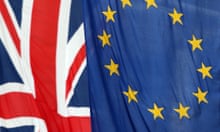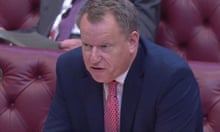British musicians are being hit by a “double whammy” of Covid-19 restrictions and costly post-Brexit bureaucracy that could decimate European touring, according to industry figures and artists who are calling for changes to trade agreement with the EU.
Under the Brexit deal British musicians planning to play in Europe will now have to secure work permits for each individual country on a tour and face further red tape when it comes to transporting equipment and crew.
Naomi Pohl, the deputy general secretary of the Musicians’ Union, said work permits were going to be a particular problem when touring with larger classical groups. “When you’re dealing with an orchestra, you’re talking about 70 musicians needing to get a work permit. So it’s a massive issue,” she said.
There have already been high-profile online petitions calling for the government to negotiate a free culture work permit for UK performers in the EU, with backers including Dawn French, KT Tunstall, Ronan Keating and Gary Kemp.
Pohl says there are several other points of ambiguity in the current agreement, such as whether a carnet, also known as “a passport for goods” such as instruments, will be required for musicians from other parts of the UK travelling to Northern Ireland.
Kathryn McDowell, managing director of the London Symphony Orchestra, who organises for the group that plays over 120 concerts in a typical year, says the new agreement means British orchestras may choose to reduce the number of European countries they visit to cut down on administrative costs.
She said: “I imagine that the actual approach that we need to take to our activities on continental Europe will have to change. We could go to places for a longer time. So, if you’re going for a week-long residency, then it’s one lot of paperwork.”
Income from all foreign tours for orchestras brought in revenue of £14.4m in 2019, according to a report from the Association of British Orchestras. More than half of that was generated from tours of EU countries, with Europe being the most visited region by British orchestras, accounting for three quarters of foreign gigs.
Matthew Swann, chief executive of the City of London Sinfonia, said that for smaller ensembles looking to bring European artists into the UK, there would be a new financial burden. “Getting someone across at very short notice was often difficult, but I think now it’s going to be even more complicated,” he said.
Other musicians who are going to be hit hard include freelance orchestral artists, who may have picked up casual work in the EU, and touring bands – especially those at the start of their careers who used international gigs as a way to build a fanbase.
Black Country, New Road are a group about to release their debut album in February. The group’s saxophonist, Lewis Evans, said touring Europe as a seven-piece before Brexit shaped the band and put them in a position to be signed.
He expressed fears groups trying to do the same in the future would not be able to deal with the administrative burden. “We’re in a lucky position but the bands that may be one year behind us, in terms of their trajectory, that’s the really heartbreaking thing. It’s the people who have so much to say, and aren’t going to be able to,” he said.
Stephanie Phillips of punk trio Big Joanie said losing European gigs would be a huge financial blow. “Before Covid-19 we were getting quite a lot of offers from different festivals around Europe, now we don’t really know how that will work out,” she said.
“Also why would they book a British band when they can just book someone a lot easier and a lot cheaper from a European country? It doesn’t really make sense.”
The Department for Digital Media, Culture and Sport said the UK pushed for a more “ambitious agreement with the EU” on the temporary movement of business travellers, which would have covered musicians, but its proposals were not accepted.
“We recognise that there could be some additional processes for those working in creative industries, but we have ensured that the visa application processes for longer-term business travel will be transparent to provide certainty and clarity,” a DCMS spokesperson added.









